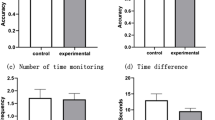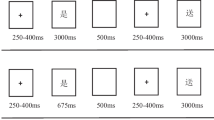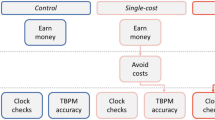Abstract
The practice effect of prospective memory is the phenomenon that the performance of prospective memory can improve through behavior training. There is indirect evidence from existing studies suggesting the existence of the practice effect of time-based prospective memory (TBPM). However, there were signs that the practice effect might be influenced by external time monitoring conditions. Therefore, we first tested whether the practice effect existed under different monitoring conditions. Then, we examined the possible causes of the practice effect with some indicators including the accuracy and reaction time of ongoing task, the number of time monitoring and the time difference. In the present study, one hundred and fifty-four undergraduate students participated in the experiment and were randomly assigned to four experimental levels. The ongoing task was the 1-back task and the prospective memory task was to press 1 key per minute. The control group only needed train the ongoing task, and the experimental group was required to practice both the ongoing task and the TBPM task. The results revealed that the performance of the TBPM task in the experimental group was better than that in the control group under different time monitoring conditions with smaller time difference and superior performance of the ongoing task. The results suggest that the practice effect of TBPM exists steadily, and two reasons contribute to the practice effect: improved effectiveness of time monitoring, and reduced attention demand on the TBPM task.
Similar content being viewed by others
References
Aberle, I., Rendell, P. G., Rose, N. S., McDaniel, M. A., & Kliegel, M. (2010). The age prospective memory paradox: Young adults may not give their best outside of the lab. Developmental Psychology, 46(6), 1444.
Block, R. A., & Zakay, D. (2006). Prospective remembering involves time estimation and memory processes. In Timing the future: The case for a time-based prospective memory (pp. 25–49).
Blondelle, G., Hainselin, M., Gounden, Y., Heurley, L., Voisin, H., Megalakaki, O., et al. (2016). Regularity effect in prospective memory during aging. Socioaffective Neuroscience & Psychology, 6(1), 31238.
Brom, S. S., & Kliegel, M. (2014). Improving everyday prospective memory performance in older adults: Comparing cognitive process and strategy training. Psychology and Aging, 29(3), 744.
Brown, S. W. (2008). The attenuation effect in timing: Counteracting dual-task interference with time-judgment skill training. Perception, 37(5), 712.
Chen, S. Y., & Zhou, R. L. (2010). Age-related declines in prospective memory: Modulation of the prospective and retrospective components. Acta Psychologica Sinica, 42(6), 640–650.
Dong, S. F., & Huang, X. T. (2010). Influencing factors and the mechanism of time-based prospective memory. Advances in Psychological Science, 18(01), 10–18.
Einstein, G. O., & McDaniel, M. A. (1990). Normal aging and prospective memory. Journal of Experimental Psychology. Learning, Memory, and Cognition, 16(4), 717–726.
Einstein, G. O., McDaniel, M. A., Richardson, S. L., Guynn, M. J., & Cunfer, A. R. (1995). Aging and prospective memory: Examining the influences of self-initiated retrieval processes. Journal of Experimental Psychology. Learning, Memory, and Cognition, 21(4), 996.
Foster, E. R., Rose, N. S., McDaniel, M. A., & Rendell, P. G. (2013). Prospective memory in parkinson disease during a virtual week: Effects of both prospective and retrospective demands. Neuropsychology, 27(2), 170–181.
Graf, P., & Grondin, S. (2006). Time perception and time-based prospective memory. In Timing the future: The case for a time-based prospective memory (pp. 1–24).
Guimond, A., Braun, C. M., Rouleau, I., & Godbout, L. (2008). The relative importance of suboperations of prospective memory. Applied Neuropsychology, 15(3), 184–193.
Guo, Y., Gan, J., Zhang, Z., Huang, T., & Chen, Y. (2016). The effects of encoding types, cognitive loading, and number of cues on prospective memory. Journal of Psychological Science, 5, 1058–1063.
Healy, A. F., Tack, L. A., Schneider, V. I., & Barshi, I. (2015). Training specificity and transfer in time and distance estimation. Memory & Cognition, 43(5), 736–747.
Hicks, J. L., Marsh, R. L., & Cook, G. I. (2005). Task interference in time-based, event-based, and dual intention prospective memory conditions. Journal of Memory and Language, 53(3), 430–444.
Hu, B., & Feng, C. (2013). The different effects of PM types, motivation, and task sequence on prospective memory. Acta Psychologica Sinica, 45(9), 944–960.
Kvavilashvili, L., & Fisher, L. (2007). Is time-based prospective remembering mediated by self-initiated rehearsals? Role of incidental cues, ongoing activity, age, and motivation. Journal of Experimental Psychology. General, 136(1), 112–132.
Kvavilashvili, L., Messer, D. J., & Ebdon, P. (2001). Prospective memory in children: The effects of age and task interruption. Developmental Psychology, 37(3), 418.
Large, E. W., & Jones, M. R. (1999). The dynamics of attending: How we track time-varying events. Psychological Review, 106(1), 119–159.
Lio, C. H., Bailey, K., Carswell, C. M., Seales, W. B., Clarke, D., & Payton, G. M. (2006). Time estimation as a measure of mental workload during the training of laparoscopic skills. Human Factors & Ergonomics Society Annual Meeting Proceedings, 50(17), 1910–1913.
Liu, C. L., & Zhou, R. L. (2012). Effects of working memory training on cognition and brain plasticity. Advances in Psychological Science, 20(7), 1003–1011.
Mäntylä, T., Missier, F. D., & Nilsson, L. G. (2009). Age differences in multiple outcome measures of time-based prospective memory. Aging, Neuropsychology, and Cognition, 16(6), 708–720.
McDaniel, M. A., & Scullin, M. K. (2010). Implementation intention encoding does not automatize prospective memory responding. Memory & Cognition, 38(2), 221–232.
Melby-Lervåg, M., & Hulme, C. (2013). Is working memory training effective? A meta-analytic review. Developmental Psychology, 49(2), 270–291.
Miles, E., Sheeran, P., Baird, H., Macdonald, I., Webb, T. L., & Harris, P. R. (2016). Does self-control improve with practice? Evidence from a six-week training program. Journal of Experimental Psychology. General, 145(8), 1075.
Mioni, G., & Stablum, F. (2014). Monitoring behaviour in a time-based prospective memory task: The involvement of executive functions and time perception. Memory, 22(5), 536–552.
Mitrovic, A., Mathews, M., Ohlsson, S., Holland, J., McKinlay, A., Ogden, S., et al. (2014). A virtual reality environment for prospective memory training. In UMAP 2014 Late Breaking results (Vol. 54, pp. 227–243).
Paine, N. J., Bosch, J. A., Ring, C., Drayson, M. T., & Jj, V. V. Z. (2015). Induced mild systemic inflammation is associated with impaired ability to improve cognitive task performance by practice. Psychophysiology, 52(3), 333–341.
Panagiotidi, M., & Samartzi, S. (2013). Time estimation: Musical training and emotional content of stimuli. Psychology of Music, 41(5), 620–629.
Qiu, J., Huang, X., & Yu, X. (2017). Does attention control affect rhythmic temporal expectation? Advances in Psychological Science, 25(12), 2145.
Rendell, P. G., & Craik, F. I. M. (2000). Virtual week and actual week: Age-related differences in prospective memory. Applied Cognitive Psychology, 14(7).
Rose, N. S., Rendell, P. G., Hering, A., Kliegel, M., Bidelman, G. M., & Craik, F. I. (2015). Cognitive and neural plasticity in older adults' prospective memory following training with the virtual week computer game. Frontiers in Human Neuroscience, 9, 592.
Shipstead, Z., Redick, T. S., & Engle, R. W. (2012). Is working memory training effective? Psychological Bulletin, 138(4), 628.
Sweeney, M. M., Rass, O., Johnson, P. S., Strain, E. C., Berry, M. S., Vo, H. T., et al. (2016). Initial feasibility and validity of a prospective memory training program in a substance use treatment population. Experimental and Clinical Psychopharmacology, 24(5), 390.
Taatgen, N. A., Van Rijn, H., & Anderson, J. (2007). An integrated theory of prospective time interval estimation: The role of cognition, attention, and learning. Psychological Review, 114(3), 577.
Teixeira, S., Magalhães, F., Marinho, V., Velasques, B., & Ribeiro, P. (2016). Proposal for using time estimation training for the treatment of Parkinson’s disease. Medical Hypotheses, 95, 58–61.
Troyer, A. K., & Murphy, K. J. (2007). Memory for intentions in amnestic mild cognitive impairment: Time- and event-based prospective memory. Journal of the International Neuropsychological Society Jins, 13(2), 365.
Vanneste, S., Baudouin, A., Bouazzaoui, B., & Taconnat, L. (2016). Age-related differences in time-based prospective memory: The role of time estimation in the clock monitoring strategy. Memory, 24(6), 812–825.
Waldum, E. R., Dufault, C. L., & McDaniel, M. A. (2014). Prospective memory training: Outlining a new approach. Journal of Applied Gerontology the Official Journal of the Southern Gerontological Society, 87(6), 737–742.
Williams, D., Boucher, J., Lind, S., & Jarrold, C. (2013). Time-based and event-based prospective memory in autism spectrum disorder: The roles of executive function and theory of mind, and time-estimation. Journal of Autism and Developmental Disorders, 43(7), 1555.
Yip, B. C., & Man, D. W. (2013). Virtual reality-based prospective memory training program for people with acquired brain injury. Neurorehabilitation, 32(1), 103–115.
Yuan, H., & Huang, X. (2011). The effect of A/B personality on time-based prospective memory. Journal of Psychological Science, 34(4), 770–774.
Yuan, H., Yuan, X. Y., Yin, T. Z., Chen, Y. Z., & Huang, X. T. (2011). Impaction of interstimulus interval on prospective memory interference effect. Acta Psychologica Sinica, 43(5), 500–508.
Zinke, K., Altgassen, M., Mackinlay, R. J., Rizzo, P., Drechsler, R., & Kliegel, M. (2010). Time-based prospective memory performance and time-monitoring in children with adhd. Child Neuropsychology, 16(4), 338–349.
Author information
Authors and Affiliations
Corresponding author
Ethics declarations
The study was approved by the Ethics Committee of Southwest University and all the participants needed to sign the informed consent form.
All procedures performed in the present study involving humanparticipants were in accordance with the ethical standards of the institutional and/or national research committee and with the 1964 Helsinkideclaration and its later amendments or comparable ethical standards.
Conflict of Interest
We have no conflict of interest in the present study.
Additional information
Publisher’s Note
Springer Nature remains neutral with regard to jurisdictional claims in published maps and institutional affiliations.
Rights and permissions
About this article
Cite this article
Guo, Y., Huang, X. Time-based prospective memory has plasticity in behavior under different monitoring conditions. Curr Psychol 40, 3386–3392 (2021). https://doi.org/10.1007/s12144-019-00270-5
Published:
Issue Date:
DOI: https://doi.org/10.1007/s12144-019-00270-5




